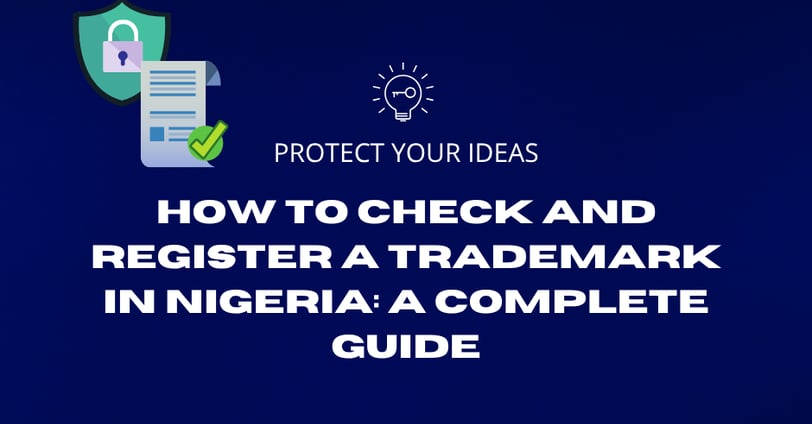How to Register a Trademark in Nigeria: Everything You Need to Know
Learn how to check, register, and protect your trademark in Nigeria. Explore the step-by-step process, costs, trademark classes, renewal rules and legal requirements to secure your brand effectively.
LEARNING TIPS
6/5/20253 min read


If you're considering trademarking your brand name, logo, or design in Nigeria, it’s crucial to ensure it hasn’t already been registered by someone else. This involves performing a trademark search through Nigeria’s official Trademarks, Patents, and Designs Registry.
Accessing the Nigerian Trademark Database
The Registry’s database isn’t publicly accessible without credentials. To explore registered trademarks, users must create an account on the Registry's official portal and pay a subscription fee. Due to this limitation, trademark searches are typically handled by licensed attorneys or authorized trademark agents. If you're interested in becoming an agent yourself, registration can be initiated through the official website.
Step-by-Step: How to Conduct a Trademark Search in Nigeria
To search for a trademark effectively, here’s the standard process:
Become an Authorized Agent or Use One
Access to the registry requires accreditation. If you’re not accredited, work through a registered trademark attorney or agent.Create an Account and Subscribe
Open an account on the Registry’s platform and pay the applicable fees.Search by Trademark and Class
Input the trademark (name, logo, or device) you want to search for. You must also select the correct trademark class, which defines the type of goods or services your trademark covers. Unsure about the class? Your agent can help determine the most suitable one.
Requirements for Registering a Trademark in Nigeria
To apply for a trademark, you'll need to provide:
The mark (name, logo, or design) to be registered
Full name and address of the applicant (individual or organization)
Contact information (email and phone number)
For foreign applicants: details of a local agent or attorney
Keep in mind that your application may be rejected if your trademark violates Nigerian trademark rules, such as using generic terms, misleading emblems, or imitating official insignia.
How Long Does Trademark Registration Take?
The entire registration process typically spans up to three months. While the initial search and application might be processed within a few weeks, a key delay arises during the publication stage. After your application is accepted, it is published in the Trademark Journal for a mandatory 60-day opposition period. If no objections are raised, a certificate is issued.
Trademark Validity and Renewal
Initial validity: 7 years
Renewal period: 14 years per cycle
Renewal grace period: Up to 3 months after expiry
Failure to renew within this period renders the trademark “pending,” and you temporarily lose exclusive rights. After this grace window, the mark becomes publicly available for re-registration.
Trademark Registration Process: Key Stages
Here are the three major phases of trademark registration in Nigeria, overseen by the Trademarks, Patents and Designs Registry under the Federal Ministry of Industry, Trade and Investment:
1. Trademark Search
This is a preliminary investigation to check for existing trademarks that may conflict with your proposed mark. If your mark is too similar to a registered one, you’ll need to create a new design or name.
2. Application Filing
Once the search confirms your mark is unique, the application is filed, typically by an authorized attorney. You’ll receive an acknowledgment letter confirming submission.
3. Approval and Certification
If your mark meets all legal requirements, it is approved and published. If no opposition is raised during the publication window, your trademark will be fully certified.
Cost of Trademark Registration in Nigeria
The cost for a complete trademark registration generally falls between ₦150,000 and ₦200,000, covering:
Initial search
Filing and acceptance
Journal publication
Certification
Note: Costs may vary based on the agent used or the complexity of the mark, and may be higher for international applicants.
What Happens If You Don’t Renew on Time?
You’re given a 3-month grace period post-expiration to renew your trademark. During this phase:
You lose legal enforcement rights over the trademark.
The trademark is available for use by others, though not for registration.
After the grace period, your mark can be registered by anyone else.
Can a Trademark Be Assigned or Transferred?
Yes, trademarks can be transferred via a trademark assignment. This allows the original owner to give usage rights to another party. Here’s what’s required:
Trademark certificate
Agreement between assignor and assignee
Power of attorney or authorized agent
Payment of applicable service fees
Understanding Trademark Classes in Nigeria
Nigeria follows the Nice Classification System, a global standard for categorizing trademarks. The system is divided into:
34 classes for goods
11 classes for services
Each application must be filed under at least one class. Businesses often register under multiple classes to protect their brand more broadly. Here are a few examples:
Class 3: Cosmetics and personal care products
Class 5: Pharmaceuticals and medical goods
Class 9: Electronic devices and software
Class 25: Clothing and footwear
Class 35: Advertising and business services
Class 41: Education and entertainment services
(For a complete list of all 45 classes, ask for a classification table.)
Final Thoughts
Trademark registration in Nigeria provides critical protection for your brand and intellectual property. Though the process requires professional guidance and due diligence, the benefits, legal exclusivity, brand security, and long-term ownership, are well worth the investment.
Always use an accredited attorney or agent to navigate the legal and administrative aspects, and make sure to monitor your trademark’s expiration date to retain full rights.
